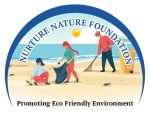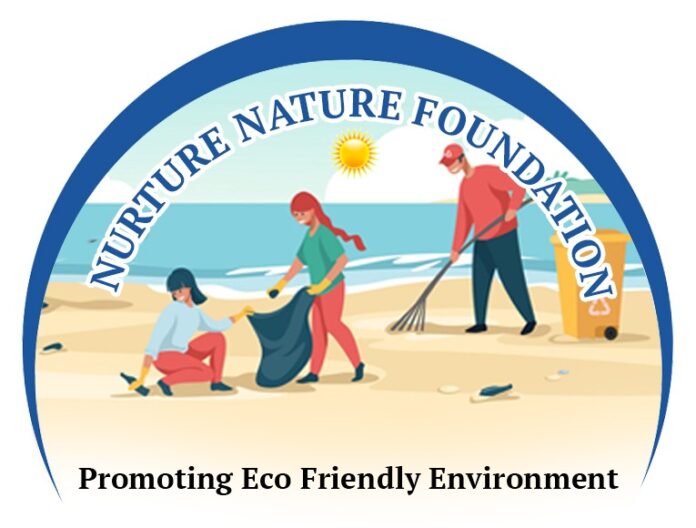By Nurture Nature Foundation (NNF)
Ghana’s beaches and lagoons are more than stretches of water and sand. They are living ecosystems, cultural meeting points, and economic engines that sustain fishing communities, host festivals, and draw tourists from around the world. Yet, walk along many of our coastlines today, and what you see is not beauty but neglect. Plastic bottles bob in the tide, fishing nets are entangled with waste, sewage seeps into lagoons, and piles of rubbish fester under the tropical sun. Residents complain, tourists turn away, and fishermen return with nets heavy with debris instead of fish. In the midst of this crisis, one question echoes across communities, policy circles, and civic discussions: who, truly, is responsible for coastal sanitation in Ghana?
The easy answer is the Ministry of Sanitation and Water Resources, which was established to oversee the nation’s sanitation framework. Yet the reality is much more complex. Sanitation does not exist in a vacuum, especially not on the coast. When plastics pollute the seas and lagoons, the Ministry of Fisheries and Aquaculture Development is affected because fish stocks decline. When tourists complain of filthy beaches, the Ministry of Tourism, Arts, and Culture is implicated. When industrial effluent flows untreated into lagoons, the Ministry of Environment, Science, Technology, and Innovation has jurisdiction. And then, at the community level, it is the Metropolitan, Municipal, and District Assemblies who bear the duty of day-to-day enforcement. This tangled web of overlapping mandates often means that accountability slips through the cracks.
The result is paralysis. Communities unsure of which authority to approach often find themselves bouncing from office to office without solutions. A fisherman whose livelihood is collapsing because of plastic pollution does not know whether to petition the Sanitation Ministry, the Fisheries Ministry, or his local assembly. A hotel operator in Ada who loses clients because of a dirty beachfront cannot easily identify which institution should respond. In this confusion, responsibility becomes diluted, urgency is lost, and Ghana’s coastlines continue to be drowned in waste.
It is here that the Nurture Nature Foundation raises its voice. For years, NFF volunteers have stood side by side with fisherfolk and community members in Jamestown, Chorkor, Ada, and other coastal areas. They have organized clean-ups, educated schoolchildren, and partnered with chiefs and elders. And yet, we see the same plastics return with every tide. Without decisive leadership, the efforts of NGOs and volunteers, no matter how passionate, will remain stopgap interventions. The truth is that coastal sanitation is not the job of one ministry, nor can it be solved by scattered initiatives. It requires an integrated, coordinated national response.
In the words of Peter Asiedu, Executive Director of Nurture Nature Foundation:
“Coastal sanitation cannot be treated as a side issue or an orphaned responsibility. It is the heartbeat of Ghana’s tourism, fisheries, and public health. We at Nurture Nature Foundation have seen firsthand how confusion cripples progress. Ministries overlap, but accountability slips. Local assemblies struggle with resources. Fisherfolk and hoteliers feel abandoned. This cannot continue. We need a clear, multi-ministerial task force with one lead ministry empowered to coordinate. The Ministry of Sanitation and Water Resources must take the lead, but not in isolation. Fisheries, Tourism, and Environment must all sit at the same table, with civil society included. Coastal sanitation is not just about sweeping sand—it is about protecting jobs, safeguarding health, and preserving national dignity. If we keep passing the buck, we will lose our beaches, our fish, and our reputation. But if we unite, we can transform our coastlines into models of pride and prosperity.”
Around the world, Ghana can find lessons. In South Africa, responsibility for coastal waste is centralized in one department but strongly implemented through municipalities with accountability mechanisms. In Kenya, the Coastal Development Authority integrates sanitation with fisheries and tourism under one umbrella. In Indonesia, a national task force on marine waste was set up directly under the President’s Office, cutting through bureaucracy and uniting ministries around one vision. These examples demonstrate that when responsibility is clarified, results follow.
What Ghana urgently needs is not another policy document but leadership that removes ambiguity. A national coastal sanitation task force, empowered by law and backed by sustainable funding, could finally give direction. Such a body would pool resources, clarify roles, enforce bylaws, and ensure that ministries no longer work in silos but in unison. Crucially, it would empower communities and NGOs with logistics and financial support to sustain local efforts. Because without the people who live on the coast, no government program can succeed.
This is why the Nurture Nature Foundation continues to emphasize that coastal sanitation is a shared duty, but one that requires clarity. Responsibility must not be blurred. If we want to save our beaches and lagoons, if we want to preserve the livelihoods of fishermen, if we want to maintain the dignity of our cultural heritage, then Ghana must decide who leads the fight.
The call to action is simple but urgent: let the Ministry of Sanitation and Water Resources take leadership in a clear partnership with Fisheries, Tourism, and Environment. Let Parliament provide legal backing and funding. Let local assemblies enforce bylaws without compromise. And let the private sector and civil society step up as partners in innovation, investment, and advocacy.
Our coastline is not just sand and water; it is our inheritance and our future. But every day we delay, the waves carry away a little more of our dignity, our health, and our economic promise. Ghana must act now.

